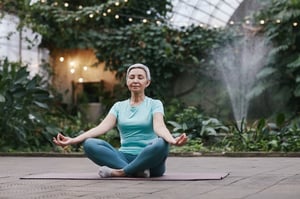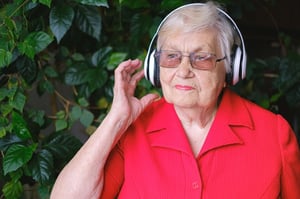According to a recent statistic published on 4th October 2021, the incidence of stroke increases...
How to Identify and Manage Anxiety in Aging
Anxiety disorders are some of the most common forms of mental health conditions. People of all age groups suffer from mental health conditions like depression, mental stress, and anxiety. Older adults aren't any different. Studies show that anxiety is very common among older adults. 10 to 20% of older adults suffer from some form of anxiety disorder, and the number may even be higher as, in many cases, the condition remains undiagnosed. This is largely because many older adults tend to avoid seeking assistance for mental health issues.
You may see people around you who have lived an amazing life. However, when they reach a certain age in their lives, they start suffering from anxiety. This has made people believe that anxiety is a natural part of aging. This is absolutely false. Many older adults tend to live and maintain a healthy and happy lifestyle. However, one of the biggest reasons that such a large percentage of older people suffer from anxiety is that they don't do anything to heal themselves, making things worse. If their anxiety is managed and treated, these older adults can also rediscover their happiness. This is why, to live a happy life, older people have to invest in caring for themselves. They need to seek the required care to manage their anxiety.
What Causes Anxiety in Older Adults?
To understand how one can reduce and manage anxiety, one should first understand the source of that anxiety. Without knowing what causes the anxiety, you cannot reduce or manage it. Let's take a look at a few factors that cause anxiety in older adults:
- Chronic grief
- Trauma
- Genetics/family history
- Drugs/medication
- Caffeine
- Alcohol consumption
- Other mental disorders
These are just some of the factors that can cause anxiety in older adults. One of the most unfortunate things about anxiety in older adults is that it usually goes unnoticed. Most of the time, the family blames it on age and lets the older person continue to suffer from anxiety. This is wrong. Older adults should be given appropriate treatment, and any symptoms of anxiety disorder should be taken seriously. No matter the age of the person, never take their anxiety disorder symptoms lightly.
Symptoms of Anxiety Disorder in Older Adults
Most of the symptoms of anxiety disorder seen in older adults are the same as those of other age groups.
 Inability to sleep at night
Inability to sleep at night- Always overthinking even seemingly insignificant things
- Regularly feeling distracted and unproductive
- Preference to be alone and avoid social situations
- Constant concern about safety for yourself and/or loved ones
- Excessive sweating
- Frequent nausea
- Troubles breathing
- Increased heart rate
- Feelings of laziness and weakness
If you or any of your family members or friends show any of the symptoms mentioned above, then it's time to see a doctor. One thing to always keep in mind is that you should never opt for self-medication. Self-medication can be very dangerous. However, many people, unfortunately, tend to opt for self-medication as their anxiety stops them from visiting a doctor. You should see a professional if you are suffering from any of the above symptoms.
One other thing to avoid is laziness. Many people who go to the doctor don't follow what the doctor has prescribed them. They feel lazy and don't care about it. You shouldn't fight it, which prevents the healing process from beginning.
How Can Older Adults Reduce and Manage Anxiety
If you are an older adult suffering from any sort of anxiety disorder, then the following techniques can help you reduce your anxiety to a manageable level. Different strategies work for different people. The trick is to keep working on them and being patient. You can't expect to see the results right away. You have to wait and be patient, and with time, you will see the difference yourself.
-
Meditate Regularly
 There are different ways you can meditate, and you can follow the technique that best suits you. Most people tend to perform yoga for meditation. Yoga is a tested method and can be easily performed by everyone. Meditate on a regular basis. Even if you think it's not helping you, keep going. It will start showing results in due course.
There are different ways you can meditate, and you can follow the technique that best suits you. Most people tend to perform yoga for meditation. Yoga is a tested method and can be easily performed by everyone. Meditate on a regular basis. Even if you think it's not helping you, keep going. It will start showing results in due course. -
Say NO to Being Lazy
Older adults who suffer from anxiety tend to get very lazy. They feel sleepy and weak all the time. This is because the anxiety forces them not to do anything. They feel lethargic, which starts a cycle of laziness and doing nothing. To break this cycle, you have to try and be more active in life. Try to exercise, go for a walk, keep yourself busy, and do anything that will stop you from staying in bed. Staying active can be a great way to manage your anxiety. -
Lower Caffeine Consumption
If you are a coffee lover, then you should work on lowering your caffeine consumption. Some people are addicted to caffeine and cannot function properly without having several cups of coffee every day. If you are one of those people, it's time to break that habit. The next point will help you in lowering your caffeine consumption. -
Sleep Well
Anxiety can be a big reason for sleep deprivation. If you want to reduce your anxiety, then having a good night's sleep is a must. You need to sleep at least 8 hours every day. Once your sleeping routine gets better, you will feel more active and fresh. This will naturally help you reduce your caffeine consumption as well. -
Listen To Soothing Music
 Studies have shown that music can have a very positive effect on your mental health. As an older adult suffering from an anxiety disorder, it can be helpful to listen to soothing music. You can either listen to it when you are lying down and relaxing or listen to such music when you are meditating.
Studies have shown that music can have a very positive effect on your mental health. As an older adult suffering from an anxiety disorder, it can be helpful to listen to soothing music. You can either listen to it when you are lying down and relaxing or listen to such music when you are meditating.
Also, check out What Is Music Therapy? And What Are the Benefits? -
Never Shy Away From Professional Help
One of the biggest problems faced by older adults suffering from anxiety disorders is that they don't seek professional help as much as they should. Never shy away from seeking professional help, as it will only yield great things for you and the people around you. Sometimes the only difference between your current anxious state and a happier and healthier lifestyle is your motivation to seek professional help for your anxiety disorder.
Let us know in the comments below - How do you manage your anxiety?






